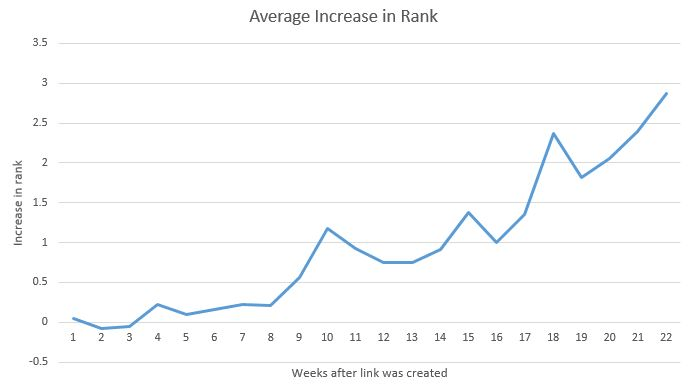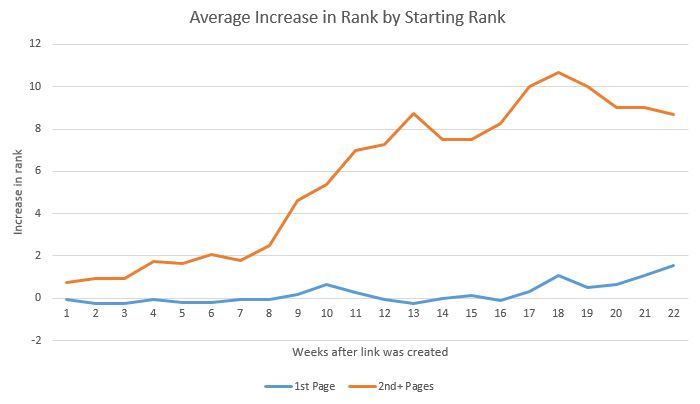Google’s backlink-focused algorithm has made link building a top priority for SEO pros for more than 20 years. And if you’re embarking on your own link building journey, then you’ll inevitably find yourself asking one key question: How long does link building take to influence rankings?
The answer is more nuanced than you might think, but it can also reveal lots of valuable information about Google’s algorithm and how you can best tackle your site’s long-term SEO strategy.
- Factors Impacting Your Link Building Timeline
- The Average Time for a Link to Affect Rankings
- How to Get the Most Out of Your Backlinks
Factors Impacting Your Link Building Timeline
One of the underlying truths of SEO is that since search engines are the ones designing and implementing their own algorithms, they’re ultimately responsible for determining the rankings of all sites.
As a result, SEO as a practice comes with no guarantees. While SEO practitioners can often predict the effectiveness of their efforts, there’s a margin of error that can never be eliminated (at least, not until SEO pros are in control of search engine algorithms—we’ll be the first to tell you if that miracle ever occurs).
All that is to say that search engine algorithms are both highly complex and entirely beyond our control, so there are myriad factors that can impact the amount of time it takes for your link building efforts to take effect.
Some of those factors include:
- Keyword difficulty: If a new backlink is crafted to target an ultra-competitive keyword, then it will likely take a longer time to improve your rankings than one targeting a less competitive keyword.
- Authoritativeness and trustworthiness: Google places a high degree of importance on sites’ reputation and track record. As such, the same backlink will generate results more quickly for sites that have proven themselves trustworthy than sites that are new or lack a sufficient amount of content.
- Crawlability and indexation: Of course, a backlink won’t do you much good if Google hasn’t even crawled or indexed the page it’s on. The sooner Google crawls and indexes the page, the sooner a link will take effect.
- Content quality: Search engines will naturally take into account the quality of the page a link is pointing to. If it’s thin, poorly optimized, or otherwise low-quality then the link likely won’t generate the results you’re looking for.
- Your current rankings: A high-quality backlink will impact a page’s rankings faster and more noticeably if the page is already ranked fairly low. But if a page is already ranked on the first page, the same backlink will have a less profound effect.
- The nofollow attribute: On a technical note, if a backlink is qualified with the nofollow attribute then Google’s algorithm won’t take it into consideration when determining rankings.
None of those factors exist in a vacuum, either—the way they interact with each other and change based on their own contributing factors will affect the amount of time it takes for a backlink to make a difference, too.
The Average Time for a Link to Affect Rankings
You’re familiar with many of the most important factors affecting your link building timeline, but what kind of time frame can you expect on average?
One study from Moz managed to nail down some concrete numbers. According to its findings, it takes about 10 weeks (or about 2.3 months) for a backlink to result in a ranking increase of one SERP position:
And as we discussed above, the lower a page’s pre-existing ranking, the more drastic (and fast) an effect the new link will have. For pages already ranking on the first page, it can take up to 22 weeks (five months) to see a ranking increase of two SERP positions. But for pages ranking on the second page or below, it takes just four weeks (one month) to see comparable results:
When interpreting this data, be sure to remember that the time frames Moz discovered only account for the amount of time that passes after a new link is created. So if you start a new link building campaign tomorrow, that doesn’t necessarily mean you can expect to see results within 10 weeks.
Instead, you’ll need to add about 10 weeks onto the amount of time it takes for you to secure the link to begin with.
How to Get the Most Out of Your Backlinks
The precise amount of time it takes for a backlink to affect rankings is only one piece of the SEO puzzle. In order to achieve the absolute best rankings possible, you need to go the extra mile to make the most of your backlink portfolio.
You can do so with the help of a few key tactics:
- Focus on quality: Creating stellar content won’t just help you secure backlinks—it will also ensure that users who follow those links like what they see and stick around for more.
- Follow up: If you just got a valuable backlink from a reputable influencer or site, build that relationship further by following up with a genuine “thank you.”
- Reevaluate anchor text: Your existing backlinks might be able to secure even more traffic for your site if their anchor text is improved, so remember to reevaluate them on a regular basis.
- Fix broken links: If a backlink is pointing to a page that no longer exists, then it will no longer help your rankings either. To prevent such a scenario, be sure to check your backlink profile for broken links and reach out to the appropriate webmasters to fix them.
- Improve old content: Getting lots of traffic from a backlink that leads to old content? Then you have a prime opportunity to capture visitors’ attention even further by repurposing or improving that content.
- Prune unnatural links: You can improve the overall quality of your backlink profile by continually searching for and promptly removing low-quality or unnatural links.
- Facilitate social sharing: Want to make your existing backlinks multiply to even more? Add social media buttons to your content to make it easy for visitors to share.
And perhaps most importantly of all, remember to be patient. Google has stated time and again that bad links of any kind won’t do your site any favors, and unscrupulous link schemes can even result in penalization.
So when you’re faced with deciding between waiting for a couple high-quality backlinks to take effect or getting a slew of low-quality backlinks now, it’s always wiser to opt for the former rather than the latter.
When It Comes to Backlinks, Patience Pays Off
Any seasoned SEO professional can tell you that backlinks won’t deliver an instant ranking boost, no matter where they come from. But if they’re excellent quality, properly optimized, and highly relevant, then higher rankings will eventually be yours.
So as you embark on your own link building journey, remember that good rankings come to those who wait.
Image credits
Moz / April 2016










